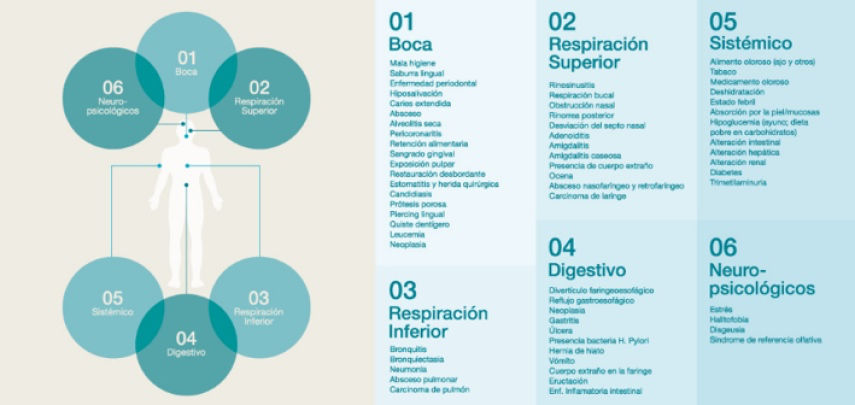Although the expression “bad breath” is the most commonly used, the medical term that defines unpleasant breath odour is “halitosis”. It is a compound of the Latin form “halitus” (exhaled air) with the Greek ending “osis” (a suffix used to describe a pathological state).
Halitosis can be brought on by over 80 causes and falls under a wide range of medical specialisations, for which reason it is more appropriate to speak of the condition in its plural form “halitoses”.
Although most patients (60%) who seek treatment suffer from halitosis of oral origin, the numbers of cases of this type of halitosis have gone down in recent years, meaning that we see more and more patients requesting consultations due to non-oral undiagnosed cause.
Extra-oral causes (related to the respiratory system, the digestive tract or of systemic origin) are responsible for approximately 17% of cases. Their diagnosis is rarely straightforward and requires cutting-edge technology, which is why it is always advisable for patients to visit a specialist halitosis centre.
Infografía causas de la halitosis
The HCP Arthyaga® protocol that is used by the Breath Institute for the diagnosis and treatment of halitosis has a 97% success rate, the highest to date.
This means that out of every 100 patients treated, at least 97 of them are completely halitosis-free after treatment. The criteria used in the study for evaluating the treatment’s success rate requires triple confirmation to establish the elimination of halitosis: confirmation from relatives; confirmation from the assessors or “odour judges”; and confirmation from the specialist bad breath measurement devices we use (gas chromatography).
Despite the widespread belief that one of the common causes of halitosis originates in the stomach, the latest reports show that the percentage of patients with this type of halitosis does not usually exceed 3% of the total number of patients seeking treatment.
Nevertheless, halitosis that originates in the stomach does exist and is often detected during consultations. It has also been proved that certain gastric and digestive diseases can predispose a person to halitosis.
A distinction must be made between physiological halitosis (e.g. which all of us have when we first wake up or during long periods of fasting) and pathological or chronic halitosis (which occurs in a different way, even shortly after eating or brushing one’s teeth).
Pathological halitosis is very difficult to prevent. The way to avoid halitosis is not through prevention but through treatment (once we have been able to determine the cause). Physiological halitosis (which in many cases is linked to poor hygiene) can be avoided using various strategies, such as: eating every four hours; avoiding strongly seasoned or smelling foods, alcohol or coffee, tobacco, diets rich in protein and calories, and rich and greasy good; drinking 1.5 litres of water a day; avoiding breathing through the mouth; and lastly, two basic oral hygiene habits: using dental floss and tongue scraping.
Firstly, it is important to take into account that, to date, over 3000 different compounds have been identified in human breath. Biosniffing or “electric nose” and gas chromatography are molecular-based devices that enable any gas present in human breath to be identified.
In any case, one of the best pieces of advice for our patients when identifying whether or not bad breath is present is to ask family members or close friends (a “confidant”). If bad breath is confirmed, the patient should visit a specialist clinic that uses gas chromatography.
